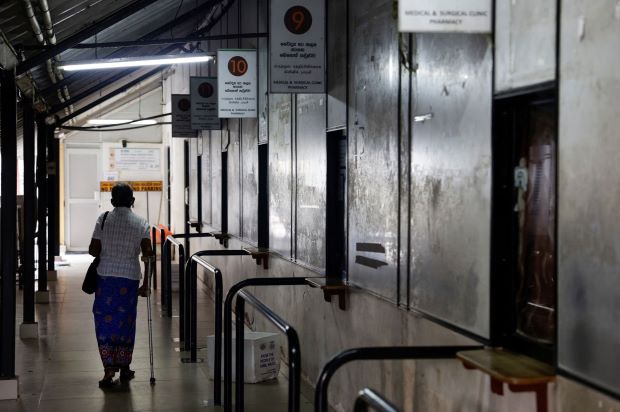Trade unions call off ‘strange’ anti-tax protest after PMD claims failure
By Shihar Aneez
COLOMBO – More than 40 state-sector trade unions in Sri Lanka called off a protest that disrupted the health and education sector largely after the Presidential Media Division (PMD) claimed that many sectors worked partially despite calls to bring the country to standstill.
The state-sector trade unions called for a full-day protest on Wednesday (15) against the tax hike.
The government has raised personal income taxes to up to 36% to reach its revenue targets which is used to maintain a bloated and inefficient state sector, amid a call from the International Monetary Fund (IMF) to reduce losses in the state-owned enterprises.
The island nation was compelled to pay 86 cents from each rupee it received from tax payers last year to sustain over 1.6 million public servants in government and semi-government institutions. According to official data, one government employee is there to serve every 14 citizens in a country with a 22 million population.
Most teachers did not report to work while state hospitals also saw absence of doctors and other health workers.
The latest tax hike brings doctors, health workers. employees at state-run Ceylon Electricity Board (CEB), Ceylon Petroleum Corporation (CPC), and port employees into the tax net for the first time.
“We hope to continue the protest against the tax hikes, because we have given them a timeline, and we are sticking to it. However, overall, the strike by the alliance has decided to suspend temporarily until next week because the president assured us to give a meeting to discuss our concerns,” said Chamil Wijesinghe, spokesman for the Government Medical Officers’ Association (GMOA).
“The trade union action today was extremely successful. Apart from Cancer, Emergency, Kidney, Tri Forces and Mental Health Hospitals, all the other government hospitals in the nine provinces collapsed due to today’s actions.”
Channa Dissanayaka, president, Ceylon Bank Employees Union, said they will withdraw from the protest until next week after they receive a letter from President Ranil Wickremesinghe on the dates for the meeting.
“This was a strike that was preventable. If they at least gave the assurance for the meeting with the President two days before, then this would not happen.”
Joseph Stalin, the General Secretary of Sri Lanka Teachers’ Union said the strike was extremely successful in the education sector.
“100% of teachers supported and the education in all schools collapsed today. If the government does not answer our requests, then we hope to go for serious actions in the future.”
However, employees from many state sector institutions except in the education and health sector said they worked as usual though some had gone on leave.
“We are not on strike but we had less work at our office because of the strike at port,” an official at Sri Lanka Customs said.
The President’s Media Unit (PMD) said most of the state sectors worked despite the protests.
The PMD quoting top officials in each government institution said 20 trains had operated by 0800 hours in the morning, CPC had processed over 300 loads of 6,600 litres of petrol and diesel to maintain normal operations, CEB Shroff and Cashier Union operated as normal, most state banks operated as usual while state-run bus transport service also operated partially despite the trade union protests.
State Finance Minister Shehan Semasinghe said the recent tax hike was to have more emphasis on direct taxes and give relief on indirect taxes.
“What people are asking without knowledge is to increase the percentage of indirect tax. It affects the entire nation. And the most rich person as well as the most poor person will have to pay equal,” Semasinghe said.
Some government officials called the protest “strange” due to the demands of the state-sector trade unions – to reduce the progressive taxes.
“This is a strange protest. Teachers who have nothing to do with the tax hike are protesting on behalf of doctors who earn multiple times of a teachers’ salary and yet don’t pay taxes,” a finance ministry official said asking not to be named.
“There is a contradiction in this protest. If they want to reduce taxes, then they should also let the government know how their salaries should be paid. Nobody is thinking about how a government is paying their salary.”
“The protesters don’t know that they are being used by their own colleagues who want to reduce their own tax which is the source for the wage of lower grade officers.”
-economynext.com



Comments are closed, but trackbacks and pingbacks are open.